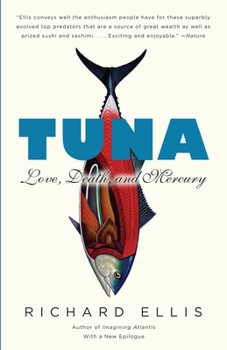Tuna: Love, Death, and Mercury
Select Format
Select Condition 
Book Overview
Famed marine researcher and illustrator Richard Ellis brings us a work of scientific achievement that will forever change the way we think about fish, fishing, and the dangers inherent in the seafood... This description may be from another edition of this product.
Format:Paperback
Language:English
ISBN:0307387100
ISBN13:9780307387103
Release Date:July 2009
Publisher:Vintage
Length:368 Pages
Weight:0.80 lbs.
Dimensions:0.8" x 5.1" x 7.9"
Customer Reviews
5 ratings
Yang Yang Zhang aka Master of Fish
Published by Thriftbooks.com User , 14 years ago
This book is full of usefull and trust worthy information! Im a proffesinal fisherman and this book is very accurate and up to date. 5 stars!
A wonderful guide for any general-interest library specializing either in fish cookery or natural hi
Published by Thriftbooks.com User , 15 years ago
Any interested in the natural history and cultural impact of the tuna will find TUNA: A LOVE STORY to be an excellent survey of the fish and its lore. Chapters cover everything from fishing lore to the tuna's environment and historic interactions with humans, surveying everything from sport fishing to the tuna's natural cousins and the food industries relying upon tuna products. A wonderful guide for any general-interest library specializing either in fish cookery or natural history.
Great but poorly edited.
Published by Thriftbooks.com User , 15 years ago
Another ocean classic by Peters, this one on Tuna, mostly the Bluefin tuna. Contains history, biological, economics and environmental info. Many interesting factoids- one of the most interesting is not about Tuna at all- seems like most of the "whalemeat" sold in Japan is actually Dolphin! This is a great read that is hampered a bit by poor editing. The author states certain facts- over and over and over. Good editing would have caught this. There's also 3 drawings of various species of Bluefin Tunas- each labeled as a different species or subspecies. However, the drawings are the same in all three cases, except one is reversed left to right. However, it is informative, current, powerful and well written.
As discussed on amazing Science Friday show
Published by Thriftbooks.com User , 15 years ago
The author appeared on one of the most amazing NPR Science Friday radio shows I've heard. These fish are compelling and the author is very engaging, knowledgable and passionate. Scientists are studying them via computer "tags" that can track them, then pop off, float to the surface and phone home. Listen to the show and see tagging in action at http://www.sciencefriday.com/program/archives/200809055
Astonishes on every page
Published by Thriftbooks.com User , 15 years ago
Meet the biggest, fastest, warmest-blooded fish in the world. Richard Ellis' fact-packed, meticulously-researched book astonishes on every page. For openers: tuna hunt in packs like wolves. They see in color. They combine the streamlining and speed of sharks with many of the warm-blooded traits of mammals. And when they are being "harvested," confined in small places to be hauled out and killed, they show panic that is visible when you look in their eyes. Everything you learn in this wonderful book about tuna will increase your respect, admiration and affection. But everything you learn about the rapacious tuna industry and its cowardly so-called "regulators" will incite your disgust. The worldwide mania for Japanese toro is a recipe for extinction. Tuna farms, rather than relieve commercial fishing pressure, instead increase it. (Bad enough it takes 3 kg of wild fish to produce 1 kg of farmed salmon--but it takes an appalling 20:1 ratio to produce farmed tuna!) Canned albacore--the kind so many parents pack for their kids' school lunches--is so full of mercury no child (or pregnant woman) should EVER eat it--but the tuna industry is so powerful you'll never find a warning on a can. That's the sort of mafia-like pressure those who make the most money from driving this beautiful wild creature to extinction bring to bear on the leaders who are supposed to protect our food and environment. Happily, in his shocking and thrilling book, Richard Ellis also tells us there is much we can do to change the picture for tuna--from pressuring our lawmakers to boycotting the most endangered tuna, the bluefin. The Western Atlantic bluefin population is 90 percent depleted and this particular tuna fishery should be closed. Those who continue to fish for, sell and purchase this fish on the eve of its extinction deserve to choke on their toro.





